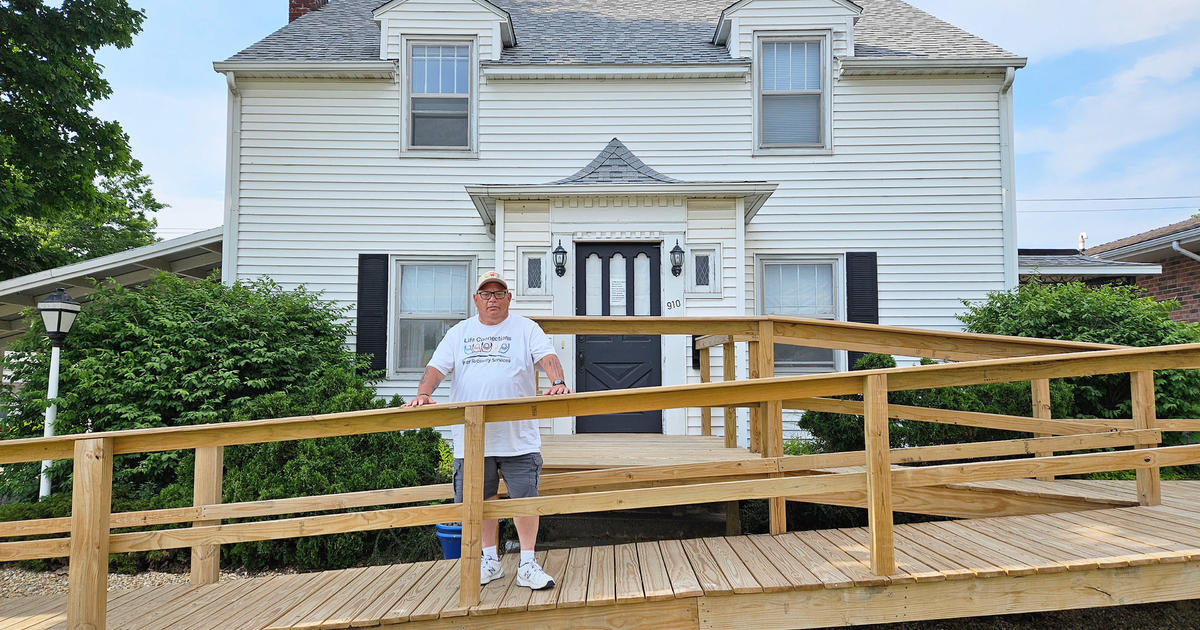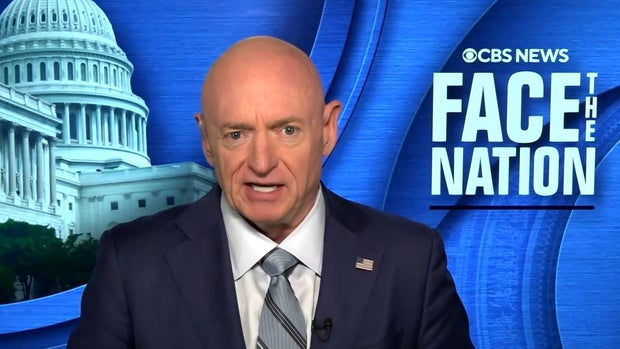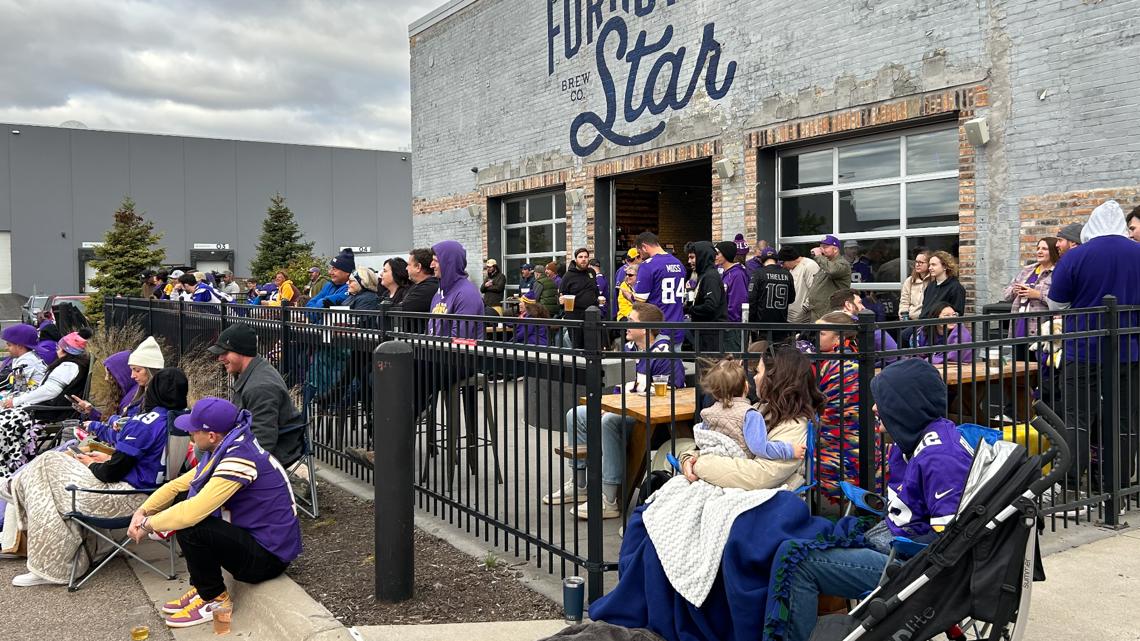CBS News
Mental health respite facilities are filling care gaps in over a dozen states

If you or someone you know may be experiencing a mental health crisis, contact the 988 Suicide & Crisis Lifeline by dialing “988,” or the Crisis Text Line by texting “HOME” to 741741.
Aimee Quicke has made repeated trips to emergency rooms, hospitals, behavioral health facilities, and psychiatric lockdowns for mental health crises — including suicidal thoughts — since she was 11.
The 40-year-old resident of Le Mars, Iowa, has bipolar and obsessive-compulsive disorders. “Some of the visits were helpful and some were not,” she said. “It was like coming in and going out and just nothing different was happening.”
Then she heard about Rhonda’s House, a rural peer respite program that opened on the other side of the state in 2018, through acquaintances in her community.
That facility, and dozens of others like it established nationwide over the past 20 years, offers a short-term, homelike, nurturing environment for people who are experiencing a mental health crisis but don’t need immediate medical attention. At respites, patients are treated like guests, proponents say, and can feel heard and keep their dignity without having to relinquish their clothes and other belongings.
During her weeklong stay at Rhonda’s House, which founder and executive director Todd Noack referred to as “a bed-and-breakfast facility for emotional distress,” Quicke made many breakthroughs, working on her self-esteem and gaining better coping skills. If she hadn’t found the program, she said, “I don’t think I would have come out of 2020.”
Public health professionals say respite facilities can potentially play a big role in addressing a national mental health crisis that accelerated dramatically during the COVID-19 pandemic, especially when it comes to suicide prevention.
“It’s a really important piece of the larger puzzle of how to improve health care and reduce suicide risk, because there is a ‘traffic jam’ in suicide prevention,” said Jane Pearson, chair of the National Institute of Mental Health Suicide Research Consortium.
Lisa Bartels
Respites rely on trained peers to provide care, and often serve patients who might otherwise visit overburdened ERs, psychiatric institutions, and therapists. Today there are 42 community-based respite programs spread across 14 states, including new ones opened recently in Tacoma, Washington, and Grand Rapids, Michigan. Most are nonprofits governed by a patchwork of state guidelines, and they’re funded by a mixture of local, state, and federal grants.
Experts say the programs fill a void, though there is little hard data on their effectiveness. Paolo del Vecchio, director of the Office of Recovery at the federal Substance Abuse and Mental Health Services Administration, said peer-run respites have proven themselves as an “evidence-based model of care,” with positive effects including reduced hospitalizations and increased engagement with community support services.
A 2015 study published online in the journal Psychiatric Services found that people who sought respite were 70% less likely to use inpatient emergency services than non-respite users.
Still, del Vecchio said, more research is needed to analyze how the programs are working and troubleshoot problems. SAMHSA is conducting a cost-benefit analysis of respite programs that officials hope to release this summer.
Pearson said she would like to see more research on who uses respites, how they are advertised, clients’ reasons for seeking them, and whether they deliver what they promise.
Respites can be especially important in rural America, where suicides increased 46% from 2000 to 2020, compared with 27.3% in urban areas, according to the Centers for Disease Control and Prevention. Rural residents also have 1½ times the rates of ER visits for self-harm as urban residents.
Del Vecchio hopes greater awareness can help bring the promising respite approach to the states with the highest suicide rates, including Wyoming, Montana, Alaska, and New Mexico.
Rhonda’s House, in Dewitt, Iowa, has provided care to 392 people over the past five years, and recently moved into a three-story, five-bedroom house with two baths. Peer specialists in Iowa must complete 30 hours of training plus six hours of ethics counseling, and then work 500 hours to become eligible to take a state certification test.
For Quicke, Rhonda’s House was a lifesaver during a brutal 2020. The pandemic had isolated her from her support system, her brother-in-law died, her long-term partner moved out, and her mother had open-heart surgery.
“There was a lot of chaos. A lot of family fights broke out. That’s when I took off — packed a bag and left for respite,” said Quicke. “There was nowhere else closer to go.”
She drove six hours from her home to Rhonda’s House, where she found 24-hour help that you “just can’t get from an emergency room or hospital.”
Unlike traditional hospital staffers, peers are available to speak with guests whenever they are needed, which Quicke appreciated since she has “a lot of panic and anxiety in the night and it’s frightful.” She also found it easy and comforting to speak with peers with “lived experience,” or firsthand experience with mental health challenges.
Allowing people to reach out for help without being judged is a crucial feature of the respite model, said Paul Pfeiffer, a psychiatrist at the University of Michigan’s medical center. He cautioned against regulations that would make them more like hospitals, noting that many people in trouble avoid getting help because they fear being locked up in a psychiatric facility.
Quicke said she learned a lot during her stay at Rhonda’s House. “I always thought I was co-dependent. I learned I just need me and my dogs. I learned wellness tools and that I can be strong and resourceful and resilient,” she said. She described being more conscious of her triggers and said she had “more routines to help with sleep hygiene.”
When Quicke left, respite staffers connected her with community resources close to her home, near the Nebraska border. They also encouraged her to call if she needed help again and told her she could return for another stay after 60 days — giving her time to work through her challenges and freeing up space for others in the meantime.
“Peer respite works 8 out of 10 times,” said Noack, the executive director. “Some people do have to leave to get another level of care, but nothing is ever perfect.”
The average cost of staying at Rhonda’s House is $428 a day — far less than the thousands of dollars a hospital stay typically costs. Noack’s respite does not bill insurance but covers the cost with state and regional contracts, as well as donations, like many other respites.
Some respites receive Medicaid funding. As this type of care grows, more states will explore Medicaid and other funding sources, said del Vecchio.
A few weeks ago Quicke became discouraged after a job rejection. She thought about going back to Rhonda’s House but said she channeled what she learned there during her stay.
“I was able to use my coping skills to get through it,” she said.
KFF Health News, formerly known as Kaiser Health News (KHN), is a national newsroom that produces in-depth journalism about health issues and is one of the core operating programs at KFF — the independent source for health policy research, polling, and journalism.
CBS News
UNICEF executive director Catherine Russell says Gaza is a “hellscape for children”

Watch CBS News
Be the first to know
Get browser notifications for breaking news, live events, and exclusive reporting.
CBS News
Sen. Mark Kelly says feds need to do a “better job” of letting Americans know “there’s a huge amount of misinformation” on election

Washington — Sen. Mark Kelly said Sunday that the federal government needs to do its part to inform Americans of the vast swath of election misinformation that’s being consumed on social media platforms like X, TikTok, Facebook and Instagram.
“It’s up to us, the people who serve in Congress and in the White House to get the information out there, that there is a tremendous amount of misinformation in this election, and it’s not going to stop on Nov. 5,” Kelly said on “Face the Nation with Margaret Brennan.”
Kelly, who sits on the Senate Intelligence Committee, said he’s seen these misinformation operations target not only his state of Arizona, but also other battleground states.
“There is a very reasonable chance I would put it in the 20 to 30% range, that the content you are seeing, the comments you are seeing, are coming from one of those three countries: Russia, Iran, China,” Kelly said.
CBS News
In a committee hearing last month on foreign threats to the 2024 election, Kelly presented screenshots of Russian-made web pages showing fabricated headlines designed to look like Fox News and The Washington Post, targeted at voters in battleground states.
“So my constituents in Arizona and others — they seek to influence the outcome of these elections, and that is absolutely beyond the pale,” Kelly said at the Sept. 18 hearing. “We’ve got to do something about it.”
Vice President Kamala Harris and former President Donald Trump each have the support of 49% of Arizona voters, according to CBS News’ battleground tracker as of Sept. 30.
In another battleground state, Pennsylvania, Trump returned Saturday to hold a rally in Butler three months after an attempted assassination on him. He was joined by members of his own party and billionaire Elon Musk, who said Trump was the only way to preserve democracy and warned of a last election if he does not win in November.
Speaking to CNN’s State of the Union on Sunday, Kelly called the social media mogul a hypocrite.
“He’s standing next to the guy that tried to overturn the 2020 election on Jan. 6, saying that this is somehow going to be the last election and they’re going to take away your vote,” Kelly said. “And you know, it just doesn’t pass the logic test.”
At the White House press briefing on Friday, President Biden – speaking from the podium for the first time since taking office – said he’s confident of a free and fair election but alluded to the 2021 insurrection at the Capitol in his concerns on whether it will be a peaceful transfer of power.
“The things that Trump has said and the things that he said last time out when he didn’t like the outcome of the election were very dangerous,” Mr. Biden said. “If you notice, I noticed that the vice-presidential Republican candidate did not say he’d accept the outcome of the election, and they haven’t even accepted the outcome of the last election.”
CBS News
Ret. Gen. Frank McKenzie says Iran is the country that’s in a corner

Watch CBS News
Be the first to know
Get browser notifications for breaking news, live events, and exclusive reporting.











GIPHY App Key not set. Please check settings